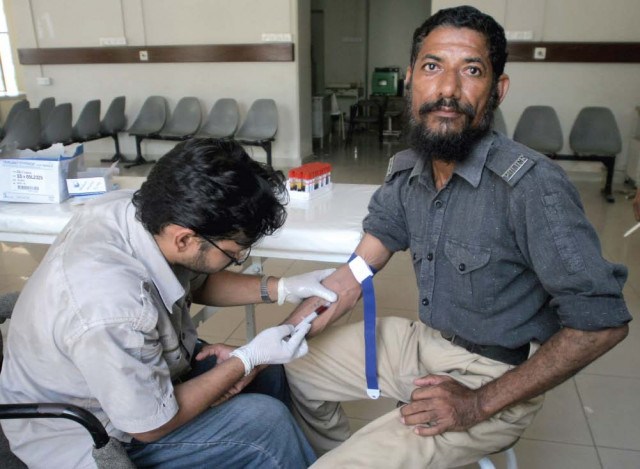Concerns raised about jail hygiene after 300 prisoners diagnosed with Hepatitis
DHA completes preparations for six-month medicine course for those affected

PHOTO: EXPRESS/FILE
During a blood screening programme, as many as 4,200 prisoners were tested of which 16 were diagnosed with Hepatitis-B, while 290 were found to be suffering from Hepatitis-C.
However, none of the prisoners were diagnosed with the Human Immunodeficiency Virus (HIV).
The screening, being conducted by the District Health Authority (DHA), has also completed preparations for carrying out a six-month medicine course for the affected prisoners.
Tests for liver and kidney diseases have already been conducted while inmates will be tested again after completion of the course to determine the percentage of the virus still present in the body.
According to the sources, the second phase of screening will soon begin in jail where all employees and security officials will undergo blood screening.
Acting DHA Chief Executive Officer (CEO) Dr Naveed Ahmed said the timely treatment of all affected patients was being ensured. He informed that the jail administration had also been instructed to ensure cleanliness in food and water being provided to prisoners while the administration was also directed to ensure immediate medical treatment of any sick prisoner.
Previously, during screenings conducted last month, as many as 157 prisoners were diagnosed with Hepatitis B and C in the prison.
Around 2,540 prisoners underwent blood screening during which 157 cases of Hepatitis C and 11 cases of Hepatitis B were detected. The District Health Authority (DHA) organised the medical camp in the Rawalpindi prison from July 8 to 24.
According to officials, the medical treatment of those diagnosed with Hepatitis C had already been initiated. The prisoners had not been prescribed the traditional injection course; instead, a three-month course of special tablets was to be given to treat the disease.
Considering the gravity of the situation, the screening camp had been extended for 10 more days and jail authorities were advised to provide clean drinking water and hygienic food to the inmates to avoid the epidemic.
Medical reports of the prisoners were sent to the Punjab health department and Inspector General of Prisons.
Moreover, a DHA informed that all blood tests including Hepatitis of prisoners had been carried out with medical consultation. Examinations, vaccinations and treatment were also being provided to the prisoners free of charge.
Published in The Express Tribune, August 5th, 2019.



















COMMENTS
Comments are moderated and generally will be posted if they are on-topic and not abusive.
For more information, please see our Comments FAQ